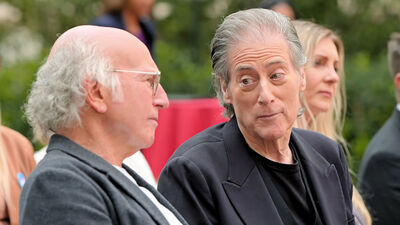Most people had no idea who Richard Lewis was back then. Sure, comedy fans knew he was on track to become one of the greats, and he was sort of breaking through, slowly, in his own way. But he could probably have walked down any big city street in America and not been noticed by anyone but people who watched a lot of late night talk shows (he was a regular on Johnny Carson and David Letterman) or saw his standup specials on cable (between 1988 and 1991, the years in which I slavishly impersonated Richard Lewis, he released three classics: I’m Exhausted, I’m Doomed, and Richard Lewis: The Magical Misery Tour).
But those who knew, knew.
He could act. He was good. His best performance is probably on “Curb Your Enthusiasm” as himself, aka Larry’s best friend. (He’d been friends with David almost his entire life.) But he was also memorable as Prince John in Mel Brooks’s “Robin Hood: Men in Tights,” where his mole changes position from shot to shot. And he was in sitcoms that were never big but built loyal audiences. One was “Anything But Love,” starring Lewis and Jamie Lee Curtis as writers at a Chicago magazine who had sexual chemistry galore but weren’t a couple. It ran three seasons and got overhauled twice by the network, which kept trying to turn a cult favorite into a hit. “Daddy Dearest,” which ran less than a year in 1993, was a father-son relationship show that teamed him with insult comic Don Rickles. It never quite figured out what it was doing, but it never got the chance to, either.
No matter. It was the standup, the monologues, the patter that made Lewis great, and that gave me a target to shoot for—in my warped mind, at least. I could’ve listened to him talk for twelve hours straight, given the chance. He might have been the coolest comic that ever lived whose stage persona was based entirely on confessing what a disaster he was.
It was the standup that made me not just love Lewis, but want to be Lewis. Even as a young man, I knew I was never going to be one of those guys who seemed to have it all figured out. But when I looked at Lewis, I saw a guy who knew he didn’t have it all figured out; in fact, he knew that he didn’t have the slightest clue how his own personality worked or what it would take for him to become happy. That appealed to me, that level of self-knowledge. Knowing what you don’t know is progress, right? Maybe a little?

